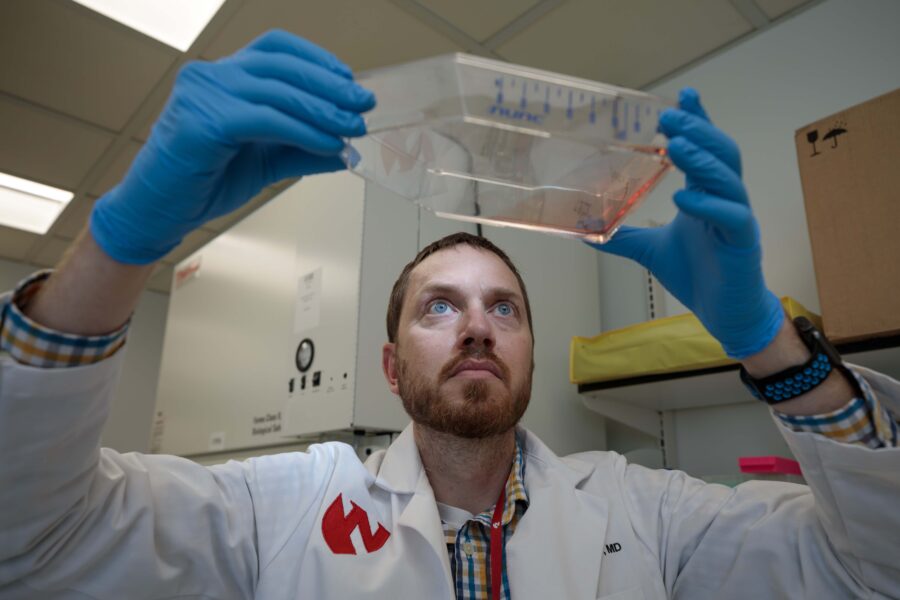Christopher Conrady, MD, PhD, an assistant professor of ophthalmology, recently received an award from the National Institutes of Health that will allow him to explore the innate immune response to a blinding herpes virus infection of the retina known as acute retinal necrosis.
By studying the earliest immune response, he hopes to identify pathways and targets for new and more effective therapies to the vision-destroying viral infection.
“This research may identify potential therapeutic targets that could either reduce viral replication and contain the virus and or reduce neuropathogenesis (development of the disease),” he said.
“The last major treatment update for this was the advent of Acyclovir back in the 1950s,” Dr. Conrady said. “We haven’t subsequently changed or made updates to the medical management of this potentially blinding condition — other than intraocular injections of foscarnet, an antiviral drug, and perhaps oral steroids.”
Dr. Conrady posits that type I interferons are central to the body’s defense to viral infection of the retina, and, with the NIH grant, will be exploring a specific receptor in the retina’s makeup that activates this response.
“The K08 award is a great achievement by Dr. Conrady and is one of the NIH K-mentored development awards that is aimed at helping early career researchers succeed, in this case a clinician-scientist,” said Howard Fox, MD, PhD, senior associate dean for research and development in the UNMC College of Medicine. “It’s a great accomplishment for an early-stage scientist, and emphasizes our strong growth in attracting the best and brightest to UNMC.”
“Dr. Conrady’s NIH-funded research will allow him to fully understand the mechanisms of sight-threatening, herpetic eye infections, as well as the body’s immune response that needs to be regulated,” said Steven Yeh, MD, professor of ophthalmology at the Truhlsen Eye Institute. “His research will undoubtedly provide insight into other aspects of viral behavior and the eye, given their broad-ranging implications, and we’re excited about his exceptionally bright future.”
Dr. Conrady’s interest in the disease grew from seeing it in his clinic.
“It can cause a blinding condition that develops very rapidly, either early or later in life. We don’t know much about it scientifically,” he said. “But the innate immune system is the earliest immune response to any infection and is likely critical. And we need to intervene very early in the disease process to limit retinal damage – because once the retina is damaged, it’s irreversibly damaged. So we need to identify the earliest critical factors, both from a viral standpoint and an immune standpoint, and see if that offers any avenues or therapeutic targets to improve long-term outcomes.”
It was his interest in this disease and others like it that led Dr. Conrady into ophthalmology, when he was doing research under the tutelage of Dan Carr, PhD, at the Dean McGee Eye Institute at the University of Oklahoma Health Sciences Center as part of his MD-PhD program. He credits mentors Dr. Yeh and Dr. Fox for helping him along his career path while at UNMC and helping him obtain this award.
“I had no plans to stay in the ophthalmology world as a graduate student transitioning back into the clinical world,” he said. But, he said, he became fascinated with uveitis – inflammation within the eye, which can have both infectious and non-infectious causes.
The award — approximately $1.7 million for the five-year project — will get him started, beginning a research trail that could lead to other awards and eventually to identifying earlier, more effective interventions he believes could alter the long-term outcomes of his patients and others with the disease.
“In order to better manage the most complex clinical problems of my uveitis patients, I elected to further pursue retina training,’ he said. “Through that, I became more interested in acute retinal necrosis, or herpes infections of the retina, due to the devastating kind of outcomes that these patients were having despite the most aggressive treatment that we could provide them.
“The potential positive impact for patients is exciting,” Dr. Conrady said.
